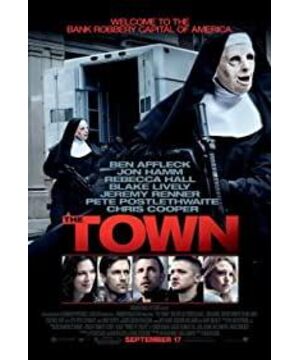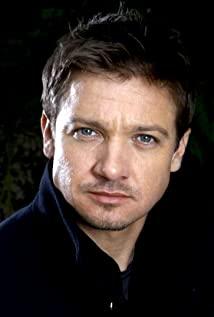Escape the subject again. XD
Town’s shots are not as hesitant as GBG. The director likes to use trivial shots and life slices to connect the characters’ mutual sight lines. (In the laundry shop scene, Doug enters the shop--pours coffee--the camera turns on the shelf-- Inadvertently look at Gisé with the inertial line of sight in the same direction). Life-oriented and familiarization are his preferred forms of expression. The overall impression of the film is blue. Wherever there is a white wall background, the light is always plated. The dim and cold colors and trivialities give the story a real sense of brilliance. Only fragments with irregular edges can spell out a complete character's mentality, an incomplete urban area and an incomplete Boston.
Compared with GBG, you can see the amazing learning ability of this guide... GBG's lens is real because of hesitation, and more personal because of jerky. In Town, the picture becomes stable, and the fluctuation is not absent, but Was hidden, hidden behind the characters. In my opinion, the direction of GBG's line of sight is actually the line of sight of the director = the line of sight of the story> the line of sight of the character, but when it comes to Town, it obviously switches to the line of sight of the character> story line of sight = the line of sight of the director.
Let’s talk about the role.
Doug&Keesey.
Coming from Charles City, the story does not tell us why he took this road (maybe mentioned in the original work), maybe it is the inertia of life, because everyone does this, he also does it, nothing more. He heard the sound of trapped beasts when he was a child, and when he grew up he became a trapped beast, but he was a bit different in it. He didn't hesitate, but he had doubts. He may happen to have a little bit more demands on life than his fellow Charles. What he desires is not here.
And Gisé, from her own point of view, she is a bad luck bank manager. She leads a serious life. One day she was suddenly broken in by a group of robbers wearing masks. She was nervous and tried. Brave, but finally return to the state of ordinary people-ordinary people have tenacity, but fragile and easy to be hurt.
But I dare say that it is this ordinary that attracted Doug. From the beginning, Doug has never had a sense of justice—maybe he has always had it, but that is not enough to support him not to choose to become a robbery skilled worker. Perhaps because of the vortex of life, he has always wanted to escape this, escape danger, and escape the possible consequences, he is afraid of prison disaster. At this point, he met Giselle, which was an "opportunity" he found for himself, and it was "a point where he thought he could leave." Just as one million loves always have a similar beginning, whoever wants to know who and who is attracted to whom, he uses his own guilt and even curiosity to support him, driving himself to open the inner engine and contact the victim. —— Fear in the process turns into a kind of passive courage, potential ability, and hope for oneself.
They had a scene in a flower field. For Doug, Gisé was his flower field, drawing nutrients from the soil, bathing in the sun, beautiful and fragile.
Jem.
Although this guide has controlled Jim's feelings for Doug (original), JR's choice of acting style is very interesting. It makes you suspicious and thinks that you want more. But normal inferences can explain his violent tendencies (perhaps closer and advocating than tendencies), and cannot deduce all of him. Seeing his family background, it is not difficult to imagine that this indifferent contains the world-weary idea that "everyone will die easily".
Through a bit of the original work by the drama, the original work is more obvious, but if this line is exposed, the dispute between right and wrong of the story will be more broken by the emotional line. The obvious thing: He cares about Doug, and he knows Doug cares about him, because Doug cares about him, he becomes more concerned about Doug—and in his own way. In his world, violence comes with ability, power, and protection. Power is the cornerstone. Even if one hundred robbers are put in jail every year in Charles City, this does not prevent newcomers from continuing to walk the same way. .
I have been wondering whether Jem advocates the origin of violence is Doug. Looking at what he does in the film, it seems, it seems, the origin is always Doug. Intriguingly, Doug would express concern, but he never stopped. But when the story inevitably reaches its final stage, this question has no meaning.
He just wants to drink a sip of Coke.
In a rough summary, outside the camera, in the story, Town is a fast-exploding combination of contradictions, from GBG's moral dilemma, to Town's survival disputes, to Argo's political contradictions, this guide literally understands the enchantment of contradiction.
Off-topic: Keesy's head up slightly looks a bit like a widow sister.
Digression 2: Even if a thousand years have passed, "Stop your hand when you finish this vote" and "Go home and get married when you finish the battle" will still be the top two on the FLAG list...
View more about The Town reviews











